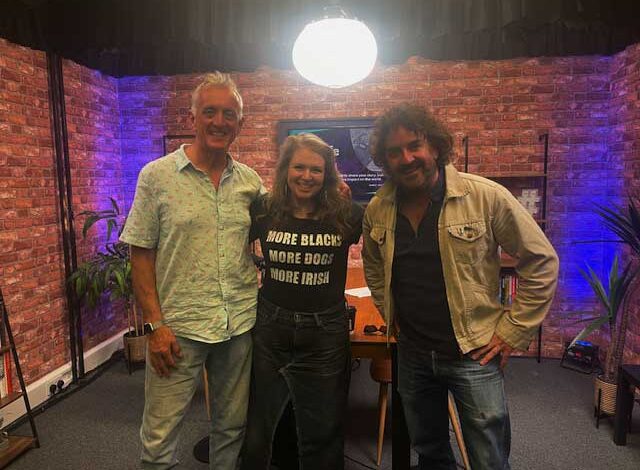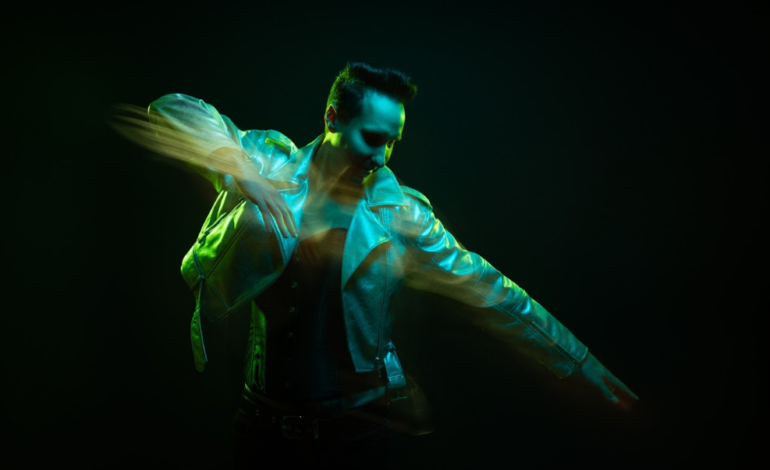Emerging from Brooklyn’s indie scene with a voice as distinctive as their perspective, queer singer/songwriter Ben Silby is finally releasing their debut album, can’t hang—a genre-defiant, emotionally candid body of work nearly a decade in the making. With a style that oscillates between theatrical camp and raw confession, Silby blurs boundaries, both sonically and structurally, to reflect a life lived boldly and vulnerably.
Shaped by years of navigating identity, city life, and creative rebirth, can’t hang is at once a personal diary and a communal invitation. Recorded with producer Miles Francis at Synthia Studios, the album captures Silby’s fearless approach to pop: unconventional, tender, and irreverently fun. From experimenting with theremins to reimagining sadness as danceable, Silby’s music offers a rare blend of melodrama and meaning, humour and heartbreak.
Urbanista sat down with Silby to talk queerness as creative compass, New York’s duality, the unexpected power of playfulness—and how “just saying the hard thing out loud” might be the most punk thing of all.
How does queerness inform your writing—not just thematically, but structurally or stylistically?
I guess I have a tendency to go off “typical” songwriting structure. I don’t know if that’s my queerness or my stubbornness. there are certain songs that feel like they should follow conventional “abab” blah blah blah, but if I’m catching another vibe I’m gonna follow that. The structure of the track “can’t hang” is kind of all over the place, and i live for that. yeah, i guess my queerness manifests in breaking “rules” lol. I also have always had an affinity for theatrics. There’s a melodrama to this album and a campiness that is definitely rooted in my queerness.
You’ve said New York City is both a muse and a character in your songs. What part of NYC shows up most in “can’t hang”
There is a loneliness that’s pervasive in the experience of living in NYC. It’s not a feeling that stays forever, but I’m sure anyone who’s lived here can relate. Being so overstimulated, yet so closed off, can be such a confusing existence. I do think the album equally emanates my favourite parts of New York; the “dgaf” attitude, the frenetic energy, there’s something tongue-in-cheek about being a part of this chaotic pulse. I moved here when I was 18, so a lot of me feels like I grew up here, and it would be hard to write anything that wasn’t influenced in some way by NYC.
What did working with Miles Francis at Synthia Studios unlock for you creatively
Meeting Miles is what made this album come to life. I had previously worked with many producers that did great work, but none of them were able to echo how I heard these songs in my head… from the first track we made together (wavy), Miles knew exactly what was up. A lot of these songs were written a long time ago, and I was starting to think they’d never be made, but there was an instant “aha” moment. Miles pushed me to use my falsetto, to play the keys on every track, to scream at the top of my lungs, to rewrite and edit, to be bold and dramatic. i am incredibly grateful for the time we had at Synthia Studios!
The theremin on “dirt ii” is so unique—how did that sonic choice come about?
The honest answer is that I was over caffeinated during a session, looked up and saw a theremin. I think I asked Miles if we could play with it, and next thing I knew we were tracking it over “dirt ii.” It was super fun to play around with, and I would love to actually learn.
How do you balance vulnerability with musical playfulness?
Honestly, since I started making music, I’ve been writing upbeat songs with heavy themes. Writing has always been how I process my emotions, and I guess I just enjoy music that is fun. When I was starting out as a songwriter, it was also clear that it’s much harder to hold people’s attention with music that is sad and sounds sad. Using “musical playfulness” is almost a way to trick people into paying attention and moving their bodies. Hopefully, the message of the lyrics is trickling down through the fun of it all.
What role does humour play in your songwriting, especially with heavier topics?
I’ve always been very talented at two things in life: being emotionally honest and making people laugh. It’s just kind of my vibration to do both at the same time (I am a cancer sun AND rising if that explains anything). I feel so deeply all the time, and I think having a sense of humour is so important, especially in times like these, where everything is so heavy. I’m a big advocate for saying the hard things out loud, getting existential, admitting what’s uncomfy, because why not? I guess keeping the music upbeat and engaging is a way of making those discomforts more palatable.
Were there any songs you almost left off the album? Why?
To be honest, “misfit.” I have been through so many different versions of this song, lyrically and production-wise wise and it was starting to feel a little stale. Finding a tongue-in-cheek perspective on the story of this song is what helped me fall back in love with it. This song is about leaving New York to live in California, about holding the city I live in too close, as if it’s part of my identity. These are lessons I learned a long time ago, and it was hard not to just judge myself for my naivete, but I’m grateful that I was able to work through it.
How did the pandemic years shape tracks like “wavy” or influence the record overall?
“wavy” was actually written during the pandemic. The first line, “I feel better in my bedroom” is probably what gives that away. The pandemic was a huge catalyst for change in my social circles and perception of my self-worth. The opportunity for reflection during our locked-down days honestly helped me grow so much as a person and artist, but as I changed, some of my relationships didn’t fit the same. This led to a big shift in my social circles, and an era of being quite isolated (even beyond the days of lockdown). Feeling so much more worth in myself, I was able to cut off relationships where I was giving without receiving. I wrote wavy sitting on my bedroom floor with my bong and my journal. It was one of those moments where the song just poured out, pretty surreal!
How do you hope your music resonates with other queer listeners?
All I can hope is that these feelings of darkness, resentment, joy, and sorrow resonate in a way that makes people feel less alone. there are so many woes in this life that we don’t talk about, or are considered “taboo,” and having an identity that is queer or trans or “other” can be so deflating in terms of the human experience. you see people debating your rights or whether or not you deserve to exist, when we’re all facing the same internal struggle of “what the hell am i doing here and how do i find happiness despite the crazy shit going on in this world?” i think it’s okay to be not okay, it’s okay to lose faith, and what’s helped me through those times is holding myself close and telling sweet beautiful ben that they’re perfect, no matter who, what, where they are.
Did your live performance style evolve alongside the album’s creation?
Yes. As I was recording this album, I threw together a band with some people I barely knew so I could play live shows. Before we knew it, two years had gone by, and these people I barely knew have become my dear friends, and we’re getting booked without even trying. The songs on this album have a much more rock feel when I play them live with my band (we’re called girliecurse). I feel the recorded album serves the lyrics and stories of these songs, whereas when we play live, we are embodying the catharsis of it all. And I truly love the music both ways.


